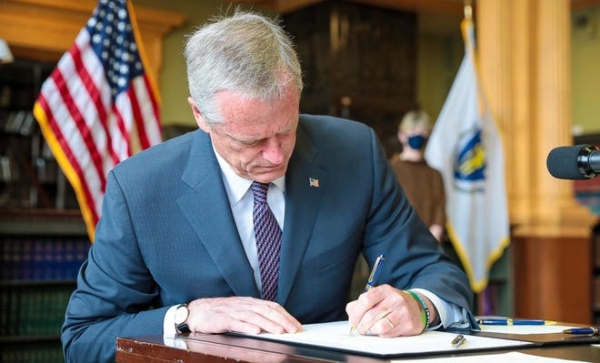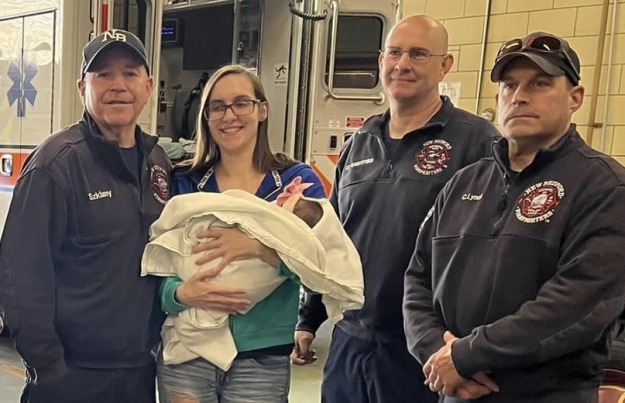Latest round of grants total more than $9.7 million.
The Baker-Polito Administration today announced $9.7 million in grants from the Skills Capital Grant Program to 47 educational organizations across the Commonwealth to update equipment and expand student enrollment in programs that provide career education. The awards announced today mark $102 million in total funding provided to high schools, colleges and other educational organizations since the program’s inception in 2015.
Governor Charlie Baker, Lt. Governor Karyn Polito, Labor and Workforce Development Secretary Rosalin Acosta and Education Secretary James Peyser visited Peabody Veterans Memorial High School to announce the awards and to tour the high school’s electrical engineering and culinary arts classrooms, which received a $175,000 award last year.
The Skills Capital Grant Program was originally launched in 2015 with the goal of replacing outdated equipment and technology, mainly at vocational technical high schools and community colleges. Since then, the program has evolved into a crucial component of local workforce training efforts by expanding the number of young people and adults trained and experienced with the newest technologies used by local employers. Approximately 40,000 students across the Commonwealth have directly benefitted from these grants.
“The Skills Capital Grants have helped give thousands of young people opportunities in high-demand jobs, and the grants have had a tremendous impact on students, schools and local businesses,” said Governor Charlie Baker. “These significant investments made over the past six years in this program with our partners in the Legislature will help train students to adapt to the changing needs of our economy.”
“Massachusetts, like the rest of the country, will face workforce challenges in the next few years, but we are poised to handle them better because of programs like the Skills Capital Grants,” said Lt. Governor Karyn Polito. “The grants enable schools, colleges and other educational institutions to revamp how students learn and gain crucial experience that serves them and employers well.”
Since 2015, 387 grants totaling more than $102 million have been awarded to 187 different schools and educational institutions across the Commonwealth, with many organizations receiving multiple grants over the years. The state’s investment also helped institutions leverage the grants to gain an additional $25 million in local matching funds.
The competitive grants are awarded to educational institutions that demonstrate partnerships with local businesses, as well as align curriculum and credentials with industry demand to maximize hiring opportunities in each region of the state. The 2018 Economic Development Bill, filed by the Governor and passed by the Legislature, established an additional $75 million in Skills Capital Grant funding over five years.
About two-thirds of the investments made with the grants are directly aligned to reduce skills gaps in high priority industry sectors, including health care, manufacturing, IT and skilled trades. A percentage of the funding, about 5 percent, has been invested in multi-year strategic projects in manufacturing, healthcare and energy training programs which are projected to have significant regional impact.
“As we continue to address economic disparities across the Commonwealth and provide solutions to employment gaps in high-demand industries, the Skills Capital Grants play a significant role in training students of all ages for successful long-lasting careers,” said Executive Office of Labor and Workforce Development Secretary Rosalin Acosta. “The impact of these grant funds on students, educational institutions, and local business partners is incredibly positive and moves us toward a more equitable economy.”
Approximately 68 percent of the funds have been awarded to traditional high schools and vocational technical schools, 24 percent going to colleges, and another 8 percent to community-based organizations. A focus of the more recent grant awards has been the launch and expansion of the Governor’s Career Technical Initiative, which supports vocational-technical schools in expanding their impact by operating programs in the afternoons for local high school students and in the evenings for workers and adult learners.
“These unprecedented and sustained investments to expand training capacity in high-demand industries, and upgrades to the quality of equipment, ensure that our students – both young people and adults – graduate with knowledge and skills that are of immediate value to them as they launch careers and to employers who need skilled workers in today’s rapidly changing economy,” said Education Secretary James Peyser.
“Training a skilled workforce is critical to the Commonwealth’s economic recovery, and the Skills Capital Grants have been a vital component of our efforts to strengthen the talent pipelines for key industries,” said Housing and Economic Development Secretary Mike Kennealy. “As we continue emerging from the economic damage inflicted by the pandemic, funding this program at this milestone level will significantly increase access to employment opportunities in every region of Massachusetts and accelerate progress toward recovery.”
In January 2020, the Administration began awarding larger multi-year grants, allowing educational institutions to apply for either one or two years of funding. In this round of grants, Massachusetts Bay Community College received a two-year grant totaling $750,000 to purchase new equipment to support students in the nursing and allied health programs. Entities which receive two-year awards require a local matching contribution of $1 to every $3 of state funding.
The Skills Capital Grants are awarded by Governor Baker’s Workforce Skills Cabinet, which was created in 2015 to bring together the Secretariats of Education, Labor and Workforce Development, and Housing and Economic Development to align education, economic development, and workforce policies in order to strategize around how to meet employers’ demand for skilled workers in every region of the Commonwealth.
 New Bedford Guide Your Guide to New Bedford and South Coast, MA
New Bedford Guide Your Guide to New Bedford and South Coast, MA








